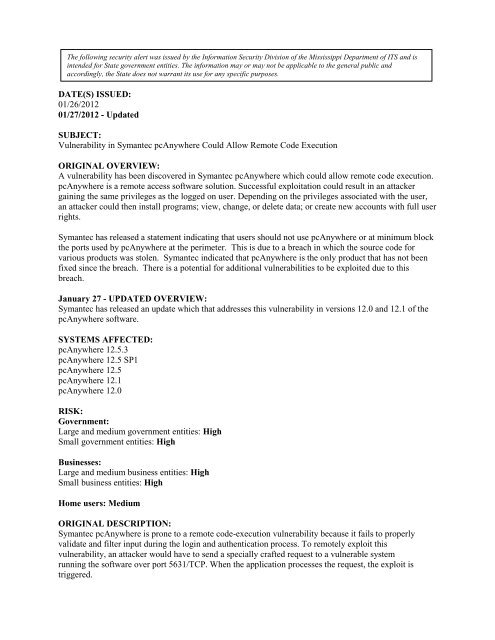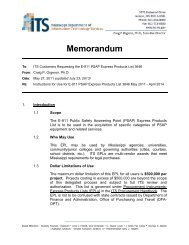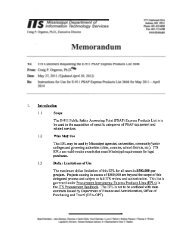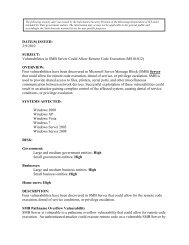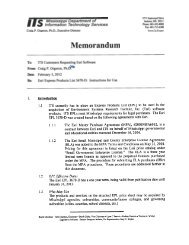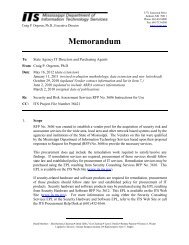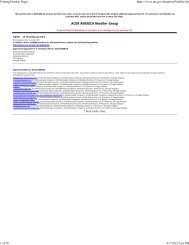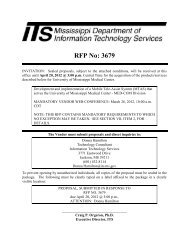Vulnerability in Symantec pcAnywhere Could Allow Remote Code ...
Vulnerability in Symantec pcAnywhere Could Allow Remote Code ...
Vulnerability in Symantec pcAnywhere Could Allow Remote Code ...
You also want an ePaper? Increase the reach of your titles
YUMPU automatically turns print PDFs into web optimized ePapers that Google loves.
The follow<strong>in</strong>g security alert was issued by the Information Security Division of the Mississippi Department of ITS and is<br />
<strong>in</strong>tended for State government entities. The <strong>in</strong>formation may or may not be applicable to the general public and<br />
accord<strong>in</strong>gly, the State does not warrant its use for any specific purposes.<br />
DATE(S) ISSUED:<br />
01/26/2012<br />
01/27/2012 - Updated<br />
SUBJECT:<br />
<strong>Vulnerability</strong> <strong>in</strong> <strong>Symantec</strong> <strong>pcAnywhere</strong> <strong>Could</strong> <strong>Allow</strong> <strong>Remote</strong> <strong>Code</strong> Execution<br />
ORIGINAL OVERVIEW:<br />
A vulnerability has been discovered <strong>in</strong> <strong>Symantec</strong> <strong>pcAnywhere</strong> which could allow remote code execution.<br />
<strong>pcAnywhere</strong> is a remote access software solution. Successful exploitation could result <strong>in</strong> an attacker<br />
ga<strong>in</strong><strong>in</strong>g the same privileges as the logged on user. Depend<strong>in</strong>g on the privileges associated with the user,<br />
an attacker could then <strong>in</strong>stall programs; view, change, or delete data; or create new accounts with full user<br />
rights.<br />
<strong>Symantec</strong> has released a statement <strong>in</strong>dicat<strong>in</strong>g that users should not use <strong>pcAnywhere</strong> or at m<strong>in</strong>imum block<br />
the ports used by <strong>pcAnywhere</strong> at the perimeter. This is due to a breach <strong>in</strong> which the source code for<br />
various products was stolen. <strong>Symantec</strong> <strong>in</strong>dicated that <strong>pcAnywhere</strong> is the only product that has not been<br />
fixed s<strong>in</strong>ce the breach. There is a potential for additional vulnerabilities to be exploited due to this<br />
breach.<br />
January 27 - UPDATED OVERVIEW:<br />
<strong>Symantec</strong> has released an update which that addresses this vulnerability <strong>in</strong> versions 12.0 and 12.1 of the<br />
<strong>pcAnywhere</strong> software.<br />
SYSTEMS AFFECTED:<br />
<strong>pcAnywhere</strong> 12.5.3<br />
<strong>pcAnywhere</strong> 12.5 SP1<br />
<strong>pcAnywhere</strong> 12.5<br />
<strong>pcAnywhere</strong> 12.1<br />
<strong>pcAnywhere</strong> 12.0<br />
RISK:<br />
Government:<br />
Large and medium government entities: High<br />
Small government entities: High<br />
Bus<strong>in</strong>esses:<br />
Large and medium bus<strong>in</strong>ess entities: High<br />
Small bus<strong>in</strong>ess entities: High<br />
Home users: Medium<br />
ORIGINAL DESCRIPTION:<br />
<strong>Symantec</strong> <strong>pcAnywhere</strong> is prone to a remote code-execution vulnerability because it fails to properly<br />
validate and filter <strong>in</strong>put dur<strong>in</strong>g the log<strong>in</strong> and authentication process. To remotely exploit this<br />
vulnerability, an attacker would have to send a specially crafted request to a vulnerable system<br />
runn<strong>in</strong>g the software over port 5631/TCP. When the application processes the request, the exploit is<br />
triggered.
Successful exploitation may result <strong>in</strong> an attacker ga<strong>in</strong><strong>in</strong>g the same privileges assigned to the application,<br />
which is System under most <strong>in</strong>stallations. Depend<strong>in</strong>g on the privileges associated with the application,<br />
an attacker could then <strong>in</strong>stall programs; view, change, or delete data; or create new accounts with full user<br />
rights.<br />
<strong>Symantec</strong> has released a Hot Fix that mitigates the issue <strong>in</strong> version 12.5 of the software. If the application<br />
is configured to receive updates via LiveUpdate, this update will be automatically applied to each<br />
vulnerable system when LiveUpdate is run. Information regard<strong>in</strong>g this hot fix can be obta<strong>in</strong>ed from the<br />
follow<strong>in</strong>g site:<br />
http://www.symantec.com/bus<strong>in</strong>ess/support/<strong>in</strong>dex?page=content&id=TECH179526<br />
<strong>Symantec</strong> also plans on releas<strong>in</strong>g fixes that will mitigate the issue <strong>in</strong> versions 12.1 and 12.0 as well.<br />
However, no fixes are available for these versions at this time.<br />
<strong>Symantec</strong> has released a statement <strong>in</strong>dicat<strong>in</strong>g that users should not use <strong>pcAnywhere</strong> or at m<strong>in</strong>imum block<br />
the ports used by <strong>pcAnywhere</strong> at the perimeter. This is due to a breach <strong>in</strong> which the source code for<br />
various products was stolen. <strong>Symantec</strong> <strong>in</strong>dicated that <strong>pcAnywhere</strong> is the only product that has not been<br />
fixed s<strong>in</strong>ce the breach. There is a potential for additional vulnerabilities to be exploited due to this<br />
breach.<br />
January 27 - UPDATED DESCRIPTION:<br />
<strong>Symantec</strong> has released an update which that addresses this vulnerability <strong>in</strong> versions 12.0 and 12.1 of the<br />
<strong>pcAnywhere</strong> software.<br />
RECOMMENDATIONS:<br />
The follow<strong>in</strong>g actions should be taken:<br />
Unless there is a bus<strong>in</strong>ess need, consider discont<strong>in</strong>u<strong>in</strong>g use of <strong>pcAnywhere</strong> until <strong>Symantec</strong><br />
<strong>in</strong>dicates otherwise.<br />
Consider block<strong>in</strong>g the <strong>pcAnywhere</strong> assigned ports of 5631/TCP and 5632/UDP at the<br />
organization’s perimeter unless there is a critical bus<strong>in</strong>ess need that requires they rema<strong>in</strong> open.<br />
Apply the Hot Fix to vulnerable systems after appropriate test<strong>in</strong>g.<br />
Run all software as a non-privileged user (one without adm<strong>in</strong>istrative privileges) to dim<strong>in</strong>ish the<br />
effects of a successful attack.<br />
REFERENCES:<br />
<strong>Symantec</strong><br />
http://www.symantec.com/security_response/securityupdates/detail.jsp?fid=security_advisory&pvid=secu<br />
rity_advisory&year=2012&suid=20120124_00<br />
http://www.symantec.com/bus<strong>in</strong>ess/support/<strong>in</strong>dex?page=content&id=TECH179526<br />
http://www.symantec.com/connect/sites/default/files/<strong>pcAnywhere</strong>%20Security%20Recommendations%2<br />
0WP_01_23_F<strong>in</strong>al.pdf<br />
ComputerWorld:<br />
http://www.computerworld.com/s/article/9223725/Threatened_by_Anonymous_<strong>Symantec</strong>_tells_users_to<br />
_pull_<strong>pcAnywhere</strong>_s_plug<br />
CVE:<br />
http://web.nvd.nist.gov/view/vuln/detail?vulnId=CVE-2011-3478<br />
Security Focus:<br />
http://www.securityfocus.com/bid/51592


